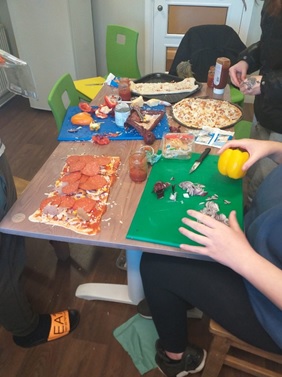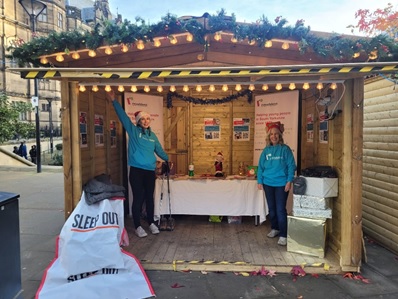For her PIPS, Jess chose to do something slightly different. She volunteered for Roundabout: South Yorkshire’s biggest youth homelessness charity which supports over 300 16-25 year olds every day. Roundabout provide a range of support from emergency accommodation, to bespoke career advice and tenancy support.
The featured image is of the roundabout logo
What did you do?
I worked for a charity called Roundabout, which is South Yorkshire’s biggest youth homelessness charity, supporting over 300 16-25 year olds, every day. They provide a range of support from emergency accommodation, to bespoke career advice and tenancy support. Because Roundabout is a relatively small, local, charity I got the opportunity to work across multiple different departments, and therefore got a great feeling of the charity overall, and how charities are managed and operate.
Two days a week I worked in ‘Central services’. This is the administrative and financial side of the charity. Here I helped with housing benefit applications, balancing books and working out why some client accounts were in arrears. I also helped in the maintenance of the client database, and learnt about the legislation surrounding trustees.
Once a week I worked at ‘Homeless prevention services’. This is a drop in service in Sheffield city centre, where young people who are homeless, or need housing advice can come, and get free, unbiased support. The best part about this service is that no young person is ever turned away, the Roundabout staff always find a safe place for them to stay. Here, I shadowed and learnt how to interview young people who presented at the service and learnt about the different streams of support available to homeless young people, either from the council or local charities. I also helped in writing their 2021 National Lottery Annual Report, and the final Children in Need report for Roundabout’s five-year funding cycle. I interpreted data collected by the drop in service and made graphs to best display the charities output and contribution towards preventing youth homelessness in South Yorkshire.
Twice a week I worked at the Roundabout hostel. Here I improved some of their documentation for recording client information, making it more stream lined and user friendly. I also spent a lot of time getting to know the young people, and supported them in day-to-day tasks. I also independently ran ‘life skill’ sessions where I baked and cooked with the residents, and organised their Christmas party.
In addition to this, I also did some work with the fundraising team. I assisted in the organisation and running of multiple events including the ‘South Yorkshire chocolate festival’, which was attended by 2000 people, a ‘Sleep out’ event, and I also ran a stall at the Sheffield Christmas market educating the public about youth homelessness and the work of Roundabout. Finally, I also got the opportunity to work with the Grants team. I successfully wrote an application to a community grant sponsored by Vodaphone, which was awarded. I also researched and wrote a letter to City Fibre enquiring about obtaining free Wi-Fi for all residents, and applied to a community grant with the South Yorkshire Community Foundation (SYCF), both of which we are yet to hear the outcome of.
What made you want to do that particular placement?
I wanted to take this PIPS opportunity to experience something outside of science, and to hopefully make a positive impact on my local community. I also wanted to gain experience and skills that are more easily recognised by companies outside of science and academia, for example in finance, management and teamwork.
How did you go about finding and planning your PIPS?
I had already heard of the amazing work being done by Roundabout in South Yorkshire, so I sent them a message on the ‘Contact us’ portion of their website, describing who I am, the skills I have, and explaining what a PIPS placement entails.
I wasn’t expecting to hear back from them, but they emailed me back almost straight away! I then arranged to meet with them in person and discuss what I could potentially do during my internship. Before this meeting I had made a fresh CV and made a list of things I would like to do during the placement, which really helped steer the meeting and plan what I could be involved in. I then started 2 months later and had the best time!
What have you gained from doing your PIPS?
The biggest thing that I gained from my PIPS was confidence in my abilities. Working in an environment where there were no expectations put on me meant that I really thrived. I have learnt that it’s always best to just give something a go even if you’re not 100 % sure on what you’re doing, it’s better to just try than to not do anything at all!
I gained more confidence in my ability to back myself and confidently put forward ideas. Working with a wide range of people at Roundabout has made me realise that as PhD students we have strong problem-solving skills and often come up with good ideas. It was really nice to be surrounded by other positive, enthusiastic members of staff. I also learnt so much about business and people management. Being an intern and working in so many different teams meant that I saw a lot of different working and management styles. I learnt so much about the general organisation of the charity, the hiring process, and how everyone’s roles fit into the overall running of Roundabout. Very interesting!
How would you sum up your PIPS experience?
My PIPS has been an amazing time and has made me realise that as PhD students we have a lot more skills than we think we do! I think I have grown a lot as a person. I am so grateful to my PIPS supervisor Geoff for taking me on, and to everyone at Roundabout for making it such a lovely time. Every day was so varied and I genuinely looked forward to going in every day!
What advice would you give to other PGRs about PIPS?
PIPS seem like a really daunting and stressful thing to organise, but in truth they are not, I promise! If you are interested in working in the charity sector I would definitely recommend reaching out to a smaller, local charity rather than a ‘big name’ charity (i.e. CRUK, the NSPCC, Age UK etc). Smaller charities have less infrastructure and are therefore more flexible and more likely to be able to take on a PIPS. Additionally, because they generally don’t take on PhD interns you can really shape what you spend your time doing and you are special because you are the first/only one!



